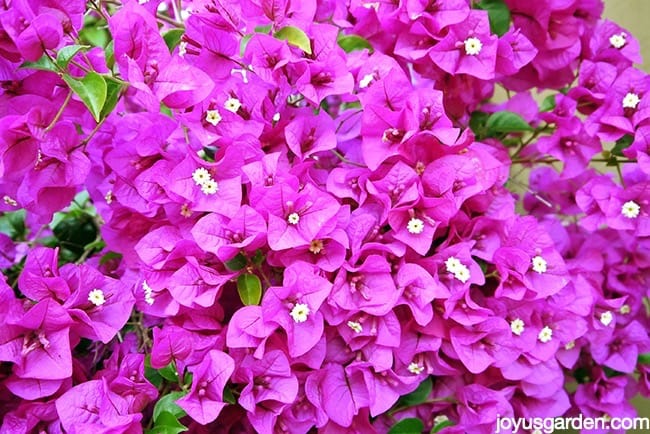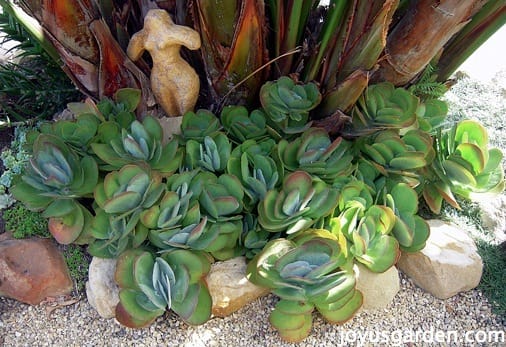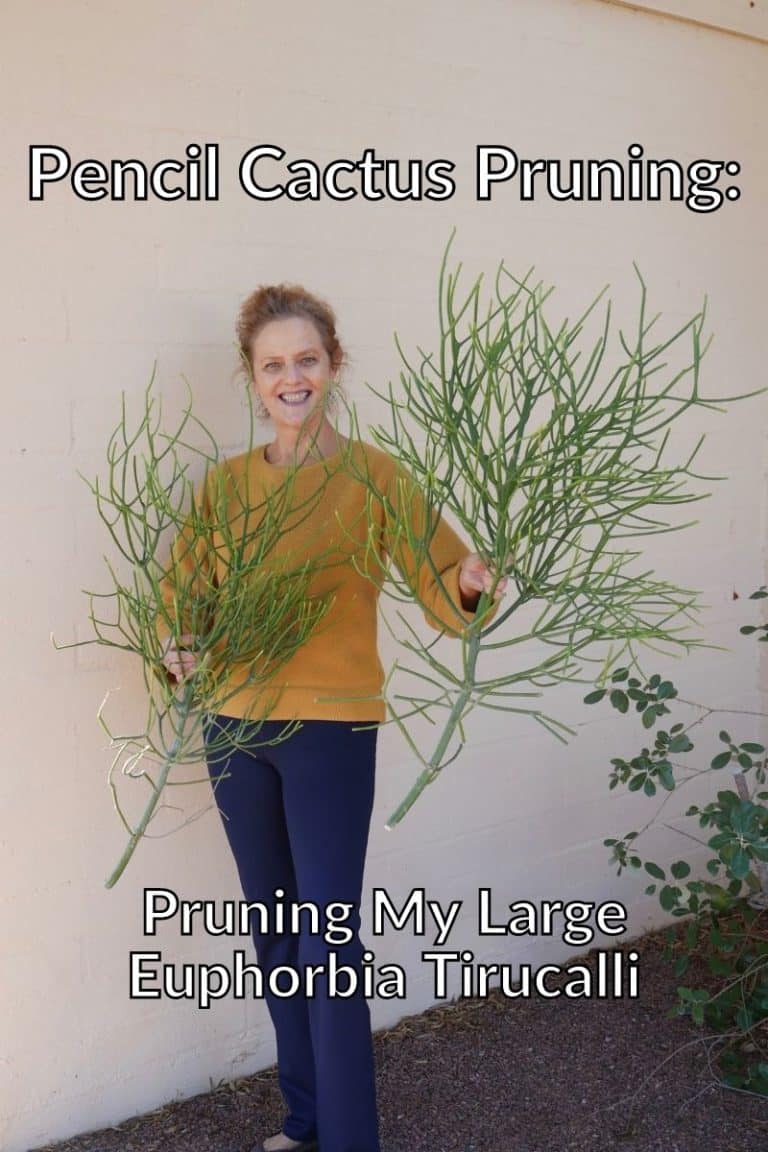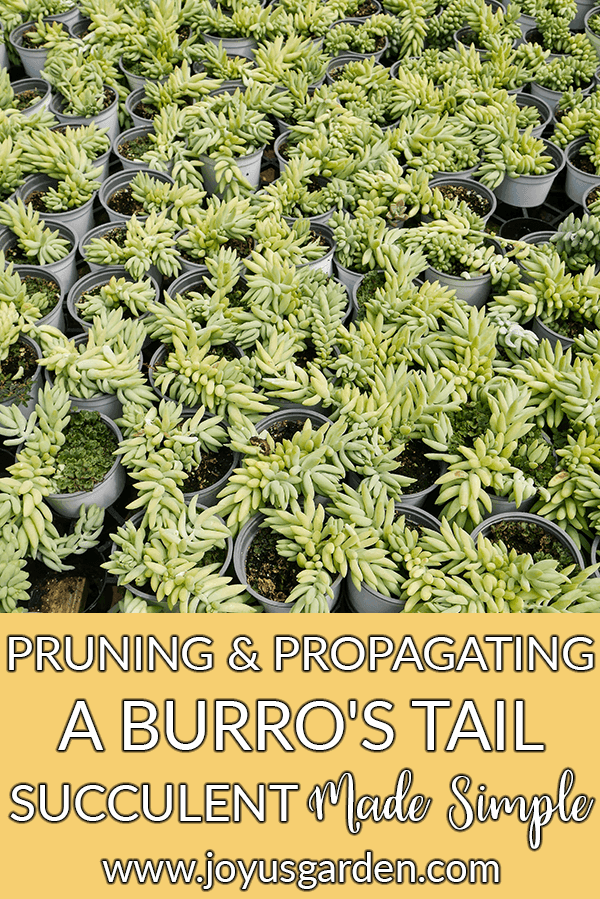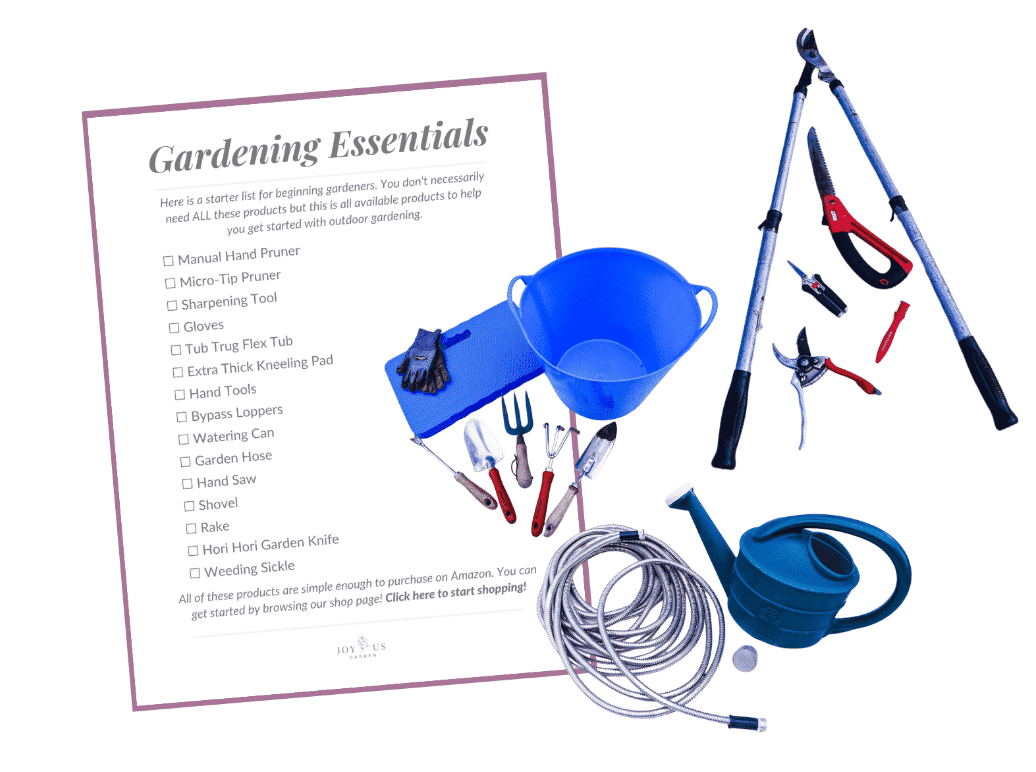How to Prune Off and Plant An Air Layered Rubber Tree Plant
This comes hot on the heels of my last post and video on propagating my Variegated Rubber Plant by the air layering technique. It’s not hard at all to do but like most methods of propagation, it just takes time for those roots to appear. After the roots have sufficiently formed (usually in 2 months or so) it’s time for the pruning off and planting of the air layered rubber plant.
The air layering method is suitable for other houseplants like the Dracaenas, Dumb cane, Umbrella Tree, Dwarf Umbrella Tree, Weeping Fig, Fiddleleaf Fig, and the Split Leaf Philodendron. It’s basically any plant which has a harder, thicker stem that’s getting too tall or too leggy. You would prune the air layering off the mother and plant it using the same materials and steps as outlined here.
Some Of Our General Houseplant Guides For Your Reference:
- 3 Ways To Successfully Fertilize Indoor Plants
- How to Clean Houseplants
- Winter Houseplant Care Guide
- Plant Humidity: How I Increase Humidity For Houseplants
- Buying Houseplants: 14 Tips For Indoor Gardening Newbies
- 11 Pet-Friendly Houseplants
Best Time to Air Layer and Plant
Spring & summer are the best times. I air-layered this Rubber tree in early April & did the cutting off in early September. It could have been done in mid-to-late June but the air layering ball (the moss which the roots grow into) & many of the roots dried out while I was on 1 of my trips escaping the summer heat here in Tucson.
You can do the air layering in spring to early summer & do the pruning off & planting in summer to early fall.
Materials Used
Felco# 2 pruners. It’s very important to make sure they’re clean & sharp. You don’t want any ragged edges or infection sets in.
A light mix for the young roots to continue growing into. I used 1/2 potting soil & 1/2 succulent & cactus mix. Wet it thoroughly before planting the baby.
1 gallon grow pot. Because the baby was already 3′ tall with no significant roots to anchor it, I used a tall & narrow pot.
A bamboo stake. This will make sure the air layering stays upright & straight while it’s rooting in.
A rag. You won’t need this for other houseplants but Ficus’, both the leaves & stems, ooze a milky sap when pruned. It could irritate you. I’ve gotten it on my skin & it hasn’t bothered me. Never get it on your face & especially not near your eyes or mouth.
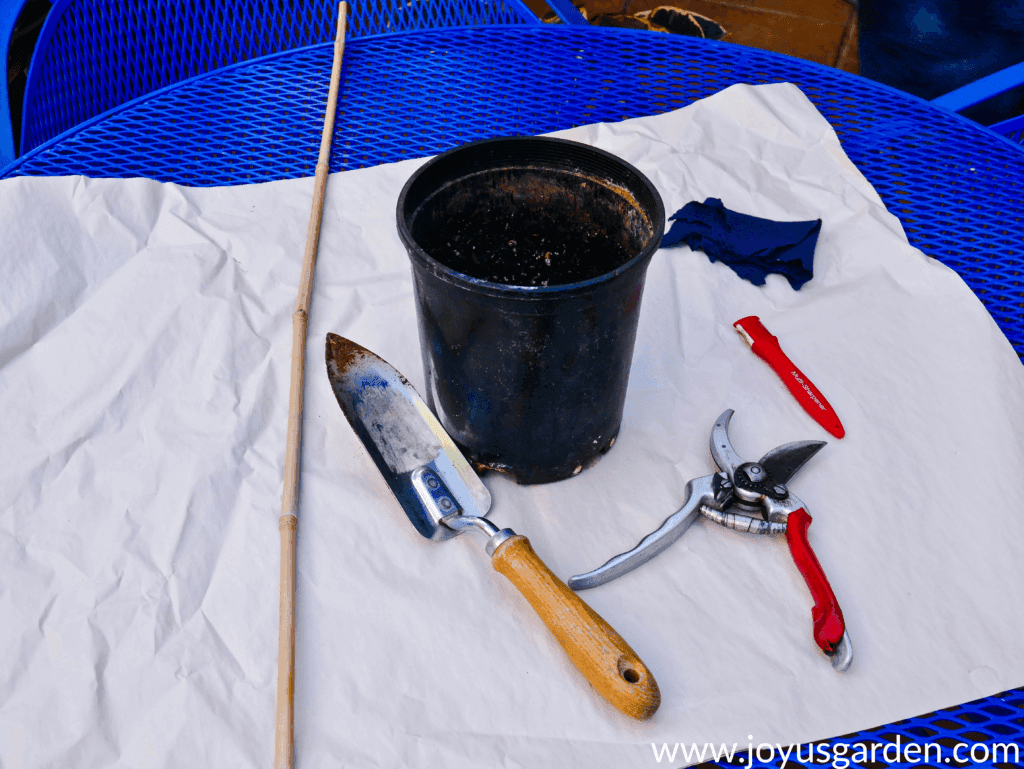
Not too many materials used for this project.
How to Maintain an Air Layered Rubber Tree
Take off 1-3 leaves which are bordering the bottom portion of the air layering. You’ll need room to cut it off.
Remove the twist ties & the plastic so you can cut the air layering off. I took another leaf off after I did this.
Cut the air layered portion (the baby) off just above a node. Make a clean cut straight across.
Dig a hole in the center of the dampened mix (my pot was initially 2/3 full) & put in the stem. I ended up cutting another 4″ or so off the bottom of the air layered stem. Stake if necessary.
Top with more mix & gently pack it in. I wanted to make sure the baby would stand straight.
Water the mix well.
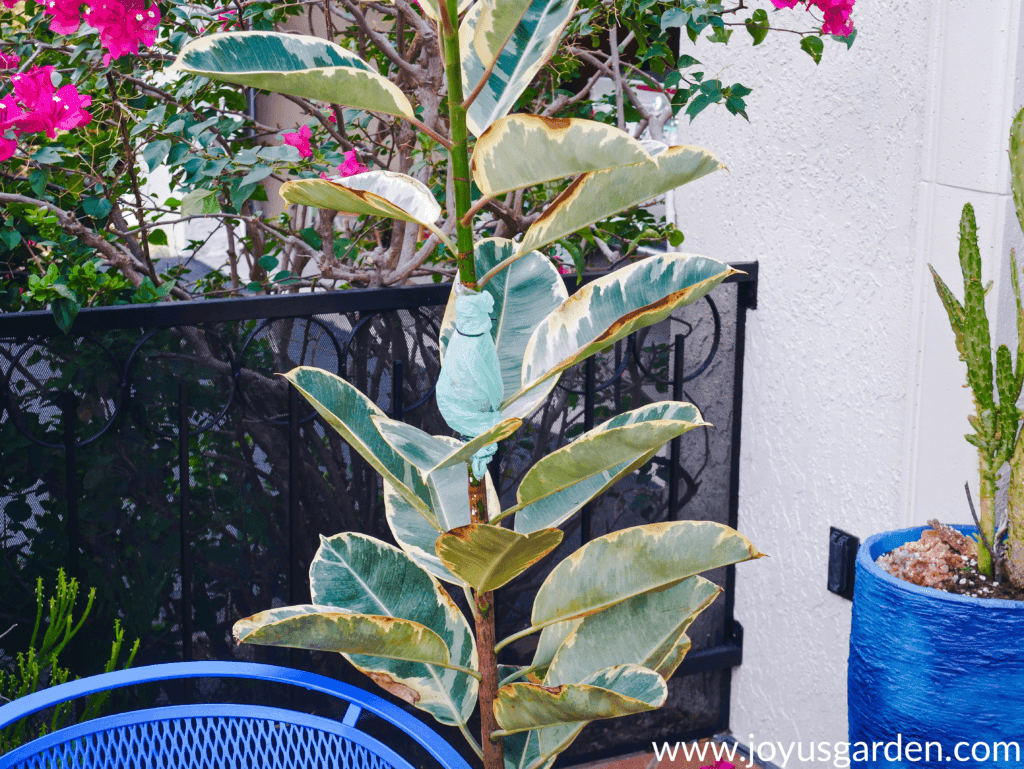
The moss ball still wrapped in plastic before the air layering was cut off.
I brought my Ficus inside & ended up putting it in my bright office. It’s about 8-10′ away from the windows. You want it in bright, natural light (a medium to high exposure) but out of any direct, hot sun.
In the warmer months (which will be thru November in Tucson) I’ll water mine every 7 days. Because the roots are still forming, keep it slightly moister than you would a mature plant. You want to strike a happy medium – not too wet & not too dry.
Back off on the watering frequency in the winter months. For me, it’ll be every 2-3 weeks.
In late winter or early spring, I’ll transplant this Variegated Rubber Plant into potting soil with a few amendments (worm compost, compost & coco coir) added in. Because these plants grow fast, I’ll repot it into a 10″ grow pot to give it room to “do its thing” in the warmer months. Read about my worm compost/compost feeding right here.
As for the mother plant, I’m waiting to see what happens. I stripped off 3 of the top leaves & a couple of the bottom. I’m leaving the rest of the leaves on for now. Sprouts should appear at the top & eventually turn into a standard (tree) form. I’ll let you know what’s up with mama next spring!
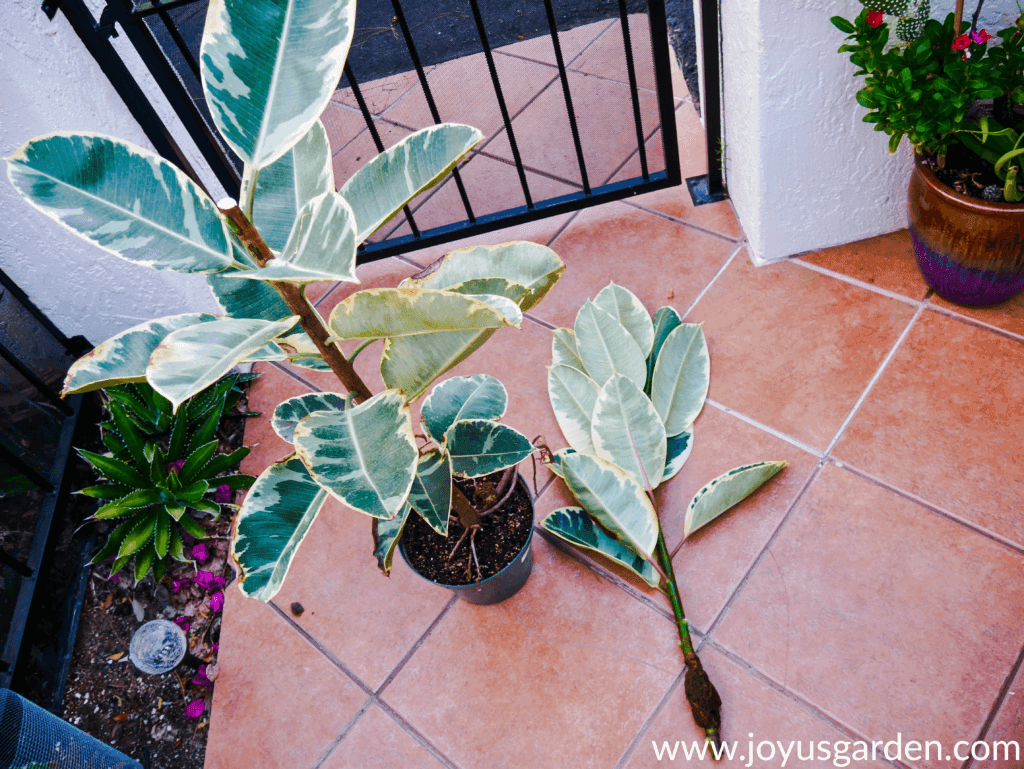
Mama & baby right after the decapitating. Both are doing great 5 days later.
How to Care for an Air Layered Rubber Plant
Make sure your pruners are clean & sharp. No wonky cuts here, please.
Water your plant before you do the pruning. I watered my Rubber Plant 2 days before.
Thoroughly dampened the moss ball before you prune it off. You want the baby roots to be good & moist for the planting.
Water the mix well before planting the air layering into it. You may need to water it a few times before it’s good & wet.
How I propagated this plant by air layering.
The wonderful thing about air layering is that you’ll instantly have another good-sized plant. It’s a handy technique to know because plants do grow and this is a great way to keep them under control. Plus, you’ll get another plant or 3!
Happy gardening,

YOU MAY ALSO ENJOY:

